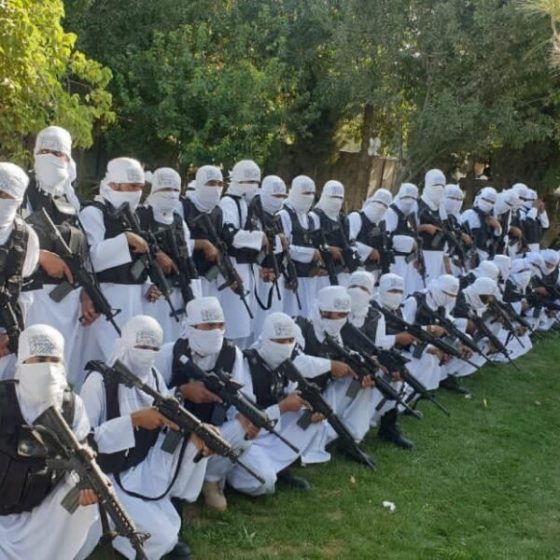
Internal Taliban departments come to the fore as squabbling impedes the formation of Afghanistan’s new Islamic Emirate
That was intensified by the adverse optics of a ragtag “resistance” in the Panjshir Valley that is still not suppressed. The “resistance” is de facto led by a CIA asset, former vice president Amrullah Saleh.
The Taliban maintain they have actually recorded numerous districts and at least four checkpoints at the Panjshir, managing 20% of its territory. Still, there’s no endgame in sight.
Supreme Leader Haibatullah Akhundzada, a Kandahar spiritual scholar, is anticipated to be the new power of the Islamic Emirate when it’s lastly formed. Mullah Baradar will likely administer simply below him as a governmental figure along with a 12-member governing council referred to as a “shura.”
If that’s the case, there would be specific similarities between the institutional role of Akhundzada and Ayatollah Khamenei in Iran, although the theocratic structures, Sunni and Shiite, are entirely various.

Mullah Haibatullah Akhundzada presenting for a photo at an undisclosed place in 2016. Image: Afghan Taliban via AFP
Mullah Baradar, co-founder of the Taliban with Mullah Omar in 1994 and sent to prison in Guantanamo then Pakistan, has actually acted as the Taliban’s top diplomat as the head of its political office in Doha.
He has actually also been an essential interlocutor in the lengthy negotiations with the now-extinct Kabul federal government and the broadened troika of Russia, China, the United States and Pakistan.
To call the negotiations to form a brand-new Afghan government fractious would be a magnificent understatement. They have actually been managed, in practice, by previous president Hamid Karzai and ex-head of the Reconciliation Council Abdullah Abdullah: a Pashtun and a Tajik who have large international experience.
Both Karzai and Abdullah are shoo-ins to be part of the 12-member shura.
As the negotiations appeared to advance, a frontal clash developed between the Taliban political office in Doha and the Haqqani network concerning the circulation of key federal government posts.
Contribute to it the function of Mullah Yakoob, boy of Mullah Omar, and the head of the effective Taliban military commission managing an enormous network of field leaders, among which he’s exceptionally well-respected.
Just recently Yakoob had let it leak that those “living in high-end in Doha” can not determine terms to those associated with battling on the ground. As if this was not controversial enough, Yakoob likewise has major problems with the Haqqanis– who are now in charge of a key post: security of Kabul through the up until now ultra-diplomatic Khalil Haqqani.

Mullah Yakoob in a file image. Picture: AFP Apart from the fact that the Taliban amount to an intricate collection of tribal and local warlords, the dissent highlights the abyss between what might roughly be explained as more Afghan nationalist-centered and more Pakistani-centered factions.
In the latter case, the crucial lead characters are the Haqqanis, who run extremely near Pakistan’s Inter-Services Intelligence (ISI).
It’s a Sisyphean job, to state the least, to create political authenticity even in an Afghanistan that is bound to be ruled by Afghans who rid the country of a foreign profession.
Considering that 2002, both with Karzai and then Ashraf Ghani, the regime in power for the majority of Afghans was regarded as an imposition by foreign occupiers verified by dodgy elections.
In Afghanistan, everything is about tribe, kin and clan. The Pashtuns are a huge tribe with myriad subtribes that all comply with the common pashtunwali, a standard procedure that blends self-esteem, independence, justice, hospitality, love, forgiveness, revenge and tolerance.
They will be in power again, as during Taliban 1.0 from 1996 to 2001. The Dari-speaking Tajiks, on the other hand, are non-tribal and form the majority of metropolitan homeowners of Kabul, Herat and Mazar-i-Sharif.
Assuming it will quietly fix its internal Pashtun squabbles, a Taliban-led federal government will always need to conquer Tajik hearts and minds amongst the country’s traders, bureaucrats and educated clergy.
Dari, derived from Persian, has actually long been the language of government administration, high culture and foreign relations in Afghanistan. Now it will all be changed to Pashto once again. This is the schism the brand-new government will have to bridge.

Taliban fighters stand guard in a lorry along the roadside in Kabul on August 16, 2021, after a strikingly swift end to Afghanistan’s 20-year war. Image: AFP
There are currently surprises on the horizon. The exceptionally well-connected Russian ambassador in Kabul, Dmitry Zhirnov, revealed that he is talking about the Panjshir stalemate with the Taliban.
Zhirnov noted that the Taliban considered some of the needs of the Panjshiris as “excessive”– as in they wanted too many seats in the federal government and autonomy for some non-Pashtun provinces, Panjshir included.
It’s not improbable to consider the widely-trusted Zhirnov could end up being an arbitrator not just between Pashtuns and Panjshiris but even between opposed Pashtun factions.
The wonderful historical irony will not be lost on those who keep in mind the 1980s jihad of the combined mujahideen against the USSR.

